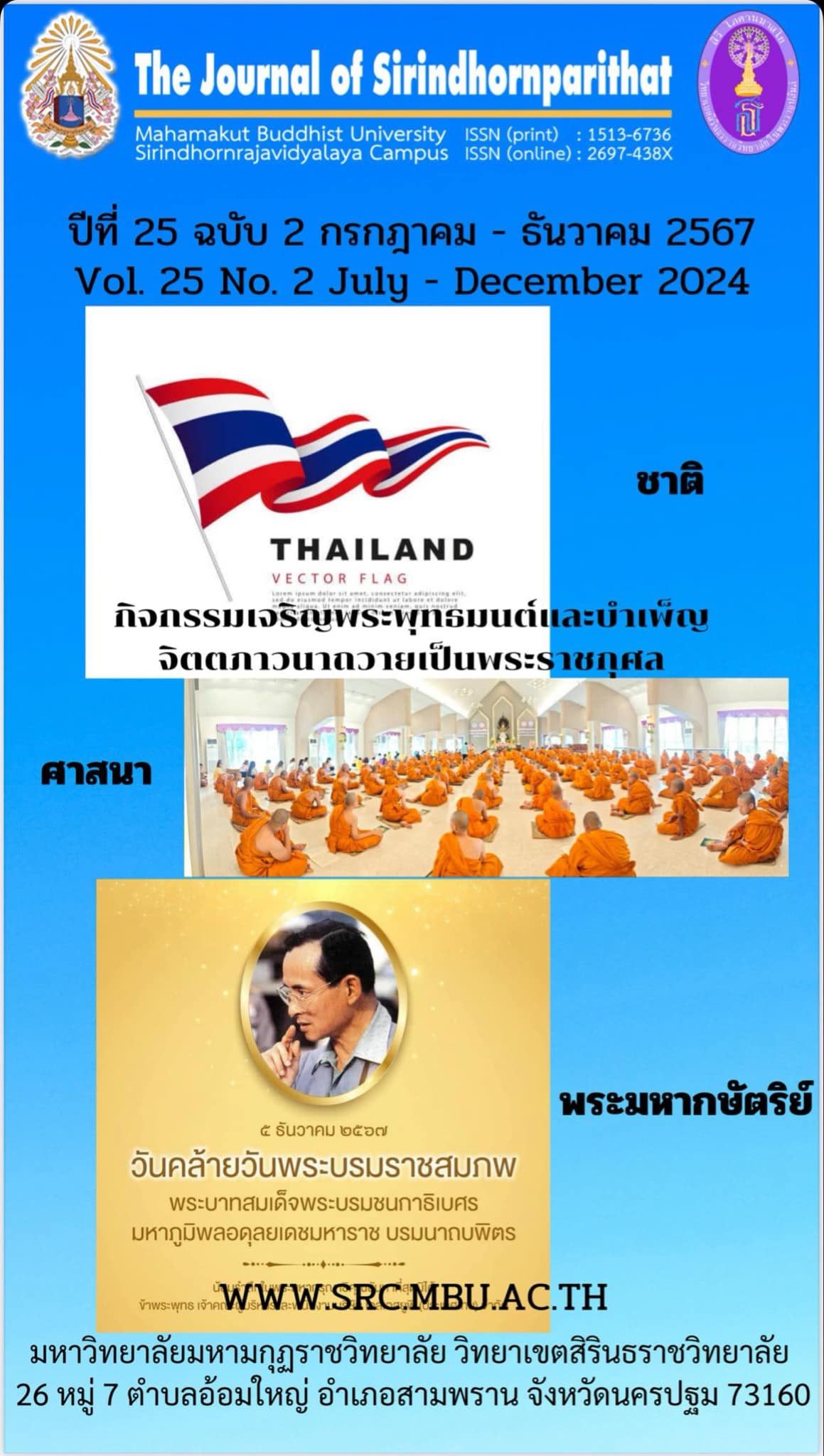Guidelines For the Development of Spiritual Leadership of Catholic School Administrators in Ratchaburi Diocese
Keywords:
Spiritual Leadership Of Catholic School, Administrators In Ratchaburi DioceseAbstract
The purpose of this research were to 1) explore the prioritizing the needs of spiritual leadership of Catholic school administrators in Ratchaburi diocese and 2) purpose the guidelines for developing spiritual leadership of administrators in Catholic school Ratchaburi diocese. The sample consisted of 19 Catholic schools in the Ratchaburi Diocese. It obtained by stratified random sampling. There are 10 information providers per school, consisting of 5 administrators and 5 teachers, totaling 190 people and 6 specifically chosen seiner experts. The research tool was the questionnaire. In the questionnaire was a 5-level estimator with a confidence value of 0.98. The questionnaires were focus group discussion and guideline for the development of spiritual leadership assessment. The statistics used in the data analysis were percentage, mean, standard deviation, popularity, content analysis and prioritizing the needs. The research results were as follows: 1. The current state of spiritual leadership of Catholic school administrators in Ratchaburi diocese was at a high level. And when considering each aspect, it was found that it was at a high level in every aspect. The averages were sorted from highest to lowest as follows: hope/faith setting vision and unselfish love. Desirable Conditions Spiritual Leadership of Catholic School Administrators in Ratchaburi Diocese was at the highest level. And when considering each aspect, it was found that it was at the highest level in every aspect. The averages were sorted from least to greatest as follows: Faith setting vision and unselfish love. 2. Guidelines for developing spiritual leadership of Catholic school administrators in Ratchaburi diocese can be summarized as follows: For faith as administrators should have the intention to perform their duties in accordance with the goals with responsibility. Being sincere to the participants is ready to perform duties to learn and act together with subordinates. Transfer knowledge, experience and exchange knowledge, listen to the opinions of subordinates are able to anticipate the outcomes that will be achieved through the collaboration. For unselfish love as administrators should be humble, honor the participants, listen to opinions, see value, be confident, and give trust and respect the decisions of coworkers. Standing as a supporter in order to give them the opportunity to share their own thinking. To build positive relationships, raise awareness of various works that focus on promoting giving to be able to look at the work in a broader perspective and move forward together. For vision setting as administrators should set goals, set directions so that everyone can see the success that will happen in the school. There were discussions and meetings to determine the direction of the practice together at least once per semester. They have to create a vision in the organization by applying knowledge and expertise in practice so that everyone has the same aims and succeed in what was set.
References
ชัยเสฎฐ์ พรหมศรี. (2557). ภาวะผู้นำองค์กรยุคใหม่ (Organizational Leadership). พิมพ์ครั้งที่ (1). ธรรกมลการพิมพ์, กรุงเทพมหานคร.
ณัฐณิชา หงส์ชัย. (2559). แนวทางการพัฒนาภาวะผู้นำเชิงจิตวิญญาณของผู้บริหารโรงเรียนเอกชนระดับประถมศึกษาในกรุงเทพมหานคร (Unpublished Master's thesis). จุฬาลงกรณ์มหาวิทยาลัย, กรุงเทพมหานคร.
นุชนาถ มีสมพืชน์. (2561). คำแบบการประยุกต์หลักการภาวะผู้นำเชิงจิตวิญญาณสำหรับผู้สอบบัญชี กลุ่มบริษัทสอบบัญชี ในประเทศไทย ((Unpublished Doctoral dissertation). มหาวิทยาลัยราชภัฎวไลยอลงกรณ์, ปทุมธานี.
เนาวรัตน์ รอดเพียน. (2560). ภาวะผู้นำเชิงจริยธรรมที่ส่งผลต่อประสิทธิภาพการบริหารงานบุคลากร ของโรงเรียนอาชีวศึกษาเอกชน เขตพื้นที่กรุงเทพมหานคร วิทยานิพนธ์ปริญญาดุษฎีบัณฑิต หลักสูตรครุศาสตร์มหาบัณฑิต สาขาวิชาบริหารการศึกษา มหาวิทยาลัยราชภัฎราชนครินทร์, ฉะเชิงเทรา.
พลวัต แสงสีงาม. (2563). แนวทางการพัฒนาภาวะผู้นำเชิงจิตวิญญาณของผู้บริหารโรงเรียนในเขตพื้นที่การศึกษาประถมศึกษาบุรีรัมย์ เขต 3. มหาวิทยาลัยรังสิต, ปทุมธานี.
รัตติกรณ์ จงวิศาล. (2559). ภาวะผู้นำ: ทฤษฎี การวิจัย และแนวทางสู่การพัฒนา (พิมพ์ครั้งที่ 3).สำนักพิมพ์จุฬาลงกรณ์ กรุงเทพมหานคร.
วรกานต์ อินทรโสภา. (2555). การพัฒนาสมรรถนะความเป็นผู้นำทางการเรียนการสอนของผู้บริหารโรงเรียนขนาดเล็ก. วิทยานิพนธ์ปริญญาดุษฎีบัณฑิต สาขาวิชาบริหารการศึกษา. ภาควิชานโยบาย การจัดการและความเป็นผู้นำทางการศึกษา คณะครุศาสตร์ จุฬาลงกรณ์มหาวิทยาลัย.
วุฒิชัย อ่องนาวา. (2561). การเสริมสร้างและพัฒนางานวิชาการในยุคไทยแลนด์ 4.0 และการขับเคลื่อนกฤษฎีกา “ศิษย์พระคริสต์ เจริญชีวิตประกาศข่าวดีใหม่”. วารสารสังฆมณฑลราชบุรี. 36: 66-69.
เอกสิทธิ์ ทินจอง, อดิศรศรีเมืองบุญ และธีระเดช จิราธนทัต. (2562). ภาวะผู้นำการเปลี่ยนแปลงของผู้บริหารวิทยาลัยอาชีวศึกษาในกลุ่มสถาบันการศึกษาพิชญบัณฑิต Transformational Leadership of Vocational College Administrators in Pichayabundit Institution Group มหาวิทยาลัยภาคตะวันออกเฉียงเหนือ, 61-79.
Aslan,Mahire & Korkut, Ali. (2015). Spiritual Leadership in Primary school inTurkey&, Journal of Education and Social Research. 6(2): 123-136.
Fairholm, G. W. (1996). Spiritual leadership: fulfilling whole- self needs at work. Leadership &Organizational Journal. 17(5): 11-17.
Fry, L.W. (2003). Toward a theory of spiritual leadership. In W. Louis (Eds.) The Leadership.
Kotter, John P. (2014). What Leader really Do. Harvard Business Review On point.
Downloads
Published
Issue
Section
License
Copyright (c) 2024 Mahamakut Buddhist University

This work is licensed under a Creative Commons Attribution-NonCommercial-NoDerivatives 4.0 International License.
บทความที่ได้รับการตีพิมพ์เป็นลิขสิทธิ์ของ มหาวิทยาลัยมหามกุฏราชวิทยาลัย วิทยาเขตสิรินธรราชวิทยาลัย
ข้อความที่ปรากฏในบทความแต่ละเรื่องในวารสารวิชาการเล่มนี้เป็นความคิดเห็นส่วนตัวของผู้เขียนแต่ละท่านไม่เกี่ยวข้องกับหาวิทยาลัยมหามกุฏราชวิทยาลัย วิทยาเขตสิรินธรราชวิทยาลัย และคณาจารย์ท่านอื่นๆในมหาวิทยาลัยฯ แต่อย่างใด ความรับผิดชอบองค์ประกอบทั้งหมดของบทความแต่ละเรื่องเป็นของผู้เขียนแต่ละท่าน หากมีความผิดพลาดใดๆ ผู้เขียนแต่ละท่านจะรับผิดชอบบทความของตนเองแต่ผู้เดียว



